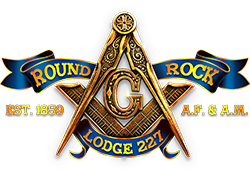Freemasonry is the oldest fraternity (men only) in the world; so old that its origins are somewhat lost in antiquity. Defining freemasonry is as difficult as defining freedom. It has many different facets and interpretations. Below is a short list of the many questions that we hear from people interested in joining us. Hopefully the accompanying answers will help.
Frequently Asked Questions
Q: What is Freemasonry
A: A one-line definition is impossible. Volumes have been written in attempt to define it. Freemasonry has been described as “a beautiful system of morality veiled in allegory, and illustrated by symbols.”
The principles in this system of morality will be more or less familiar to almost all men of good character, but they are presented in a different form from those they have known in the past, through symbols and allegory. It is primarily through this symbolism that this system has achieved its high degree of universality. There are Masons to be found in almost every country in the world, and regardless of their mother language, they all understand the same principles.
Freemasonry was founded upon principles of tolerance, freedom and free thinking. No man has the right to dictate to another what he must believe about his religion or his politics. Freemasonry is open to a wide variety of men, from many different backgrounds. How one chooses to practice his religion is his own business.
Q: Who are the Masons?
A: Men of good character who have banded together into a society concerned with morality and ethics. These men come from a wide variety of backgrounds, occupations, ethnicities, and religions, yet conduct themselves with absolute civility towards one another.
Q: Have I heard of any men who were Masons?
A: Many of our nation’s early patriots were Freemasons–George Washington, Benjamin Franklin, John Hancock, Paul Revere, John Paul Jones, Rufus King, James Otis, Baron von Steuben, and the Marquis de Lafayette–as were 13 signers of the Constitution. Fourteen Presidents, beginning with Washington, and 18 Vice-Presidents were Masons. Five Chief Justices of the U.S. Supreme Court–Oliver Ellsworth, John Marshall, William Howard Taft, Frederick Vinson, and Earl Warren–were Freemasons, and the ranks of Masonry have included a majority of Supreme Court Justices, of Governors of States, of members of the U.S. Senate, and a large percentage of members of the U.S. House of Representatives.
If you’ve heard the following names, you’ve heard of famous Masons: John Wayne, Buzz Aldrin, Winston Churchill, The Wright brothers, Voltaire, William Travis, Davy Crockett, Jim Bowie, Stephen F. Austin, Sam Houston, James Fannin, Sibelius, Mozart, Gus Grissom, Alex Hailey, Cecil B. DeMille, Nat King Cole, Gen. Douglas MacArthur, Gen. Hap Arnold, Gen. Omar Bradley, Gen. James Doolittle, William Clark and Meriwether Lewis, Charles Lindbergh, Tom Mix, Arnold Palmer, Robert Peary, Eddie Rickenbacker, Sugar Ray Robinson, Oscar Wilde, Bob Hope, Roy Rogers, Dave Thomas, etc, etc, etc. The list is vast, but suffice it to say that many of the world’s great philosophers, statesmen, and leaders have participated in the fraternity of Masons.
Q: Is Freemasonry a religion?
A: No. Neither is it a substitute for religion. No atheist can become a Mason, and meetings open and close with prayer, but there is no dogma or instruction for worship. The discussion of religion and of politics is not permitted in the lodge, as these subjects are best suited to other venues and forums. Differences in opinion and dogma can ultimately drive men apart, while Freemasonry is geared toward bringing them together, regardless of their differences.
Q: How can I become a Mason?
A: There is an old Masonic expression. “To be one, ask one” or 2B1ASK1. No one will ever invite you to become a Mason. You must take it upon yourself to pose the question to a Mason. If you have no friends who are Masons, as was the case with many of our members when they joined, stop by the lodge and introduce yourself. Before you know it, you’ll have friends who are Masons. You can find more information about petitioning on the Grand Lodge of Texas website.
